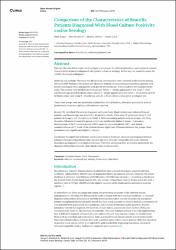Comparison of the characteristics of brucella patients diagnosed with blood culture positivity and/or serology
Citation
Konya, P., Demirturk, N., Gürbüz, M., & Colak, G. (2023). Comparison of the Characteristics of Brucella Patients Diagnosed With Blood Culture Positivity and/or Serology. Cureus, 15(8).Abstract
Abstract
Purpose: The aim of this study is to investigate and compare the clinical, laboratory, and treatment response characteristics of patients diagnosed with positive culture or serology. In this way, we wanted to assess the validity of serological diagnosis.
Materials and methods: The study was designed as a retrospective cross-sectional study between January 2010 and 2020. Patients with clinical and laboratory findings of acute/subacute brucellosis, patients with positive serological tests, and patients with growth of Brucella spp. in blood culture were included in the study. The patients were divided into three groups: Group 1 - Wright agglutination test result ≥ 1/160 and Brucella spp. growth in blood culture; Group 2 - Wright agglutination test result ≥ 1/160 and no growth in blood culture; and Group 3 - Brucella spp. growth in blood culture and negative serological test. These three groups were retrospectively evaluated for clinical features, laboratory parameters, areas of involvement, treatment options, and treatment response.
Results: We identified 294 patients diagnosed with brucellosis. Blood cultures were obtained from all patients, and Brucella spp. was detected in 40 patients (13.6%). There were 35 patients in Group 1, 254 patients in Group 2, and five patients in Group 3. When examining patients with symptoms, only fever showed a difference between the groups, which was significantly higher in Group 1. Laboratory investigations of the C-reactive protein (CRP), aspartate aminotransferase (AST), and alanine aminotransferase (ALT) levels of the patients showed significant differences between the groups; these parameters were significantly higher in Group 1.
Conclusion: No significant difference was found in terms of treatment response and prognosis between patients with and without blood culture growth who were clinically compatible with acute/subacute brucellosis as diagnosed by serological methods. Therefore, serological tests are reliable methods for the diagnosis of brucellosis in cases where blood culture is inconclusive.
















